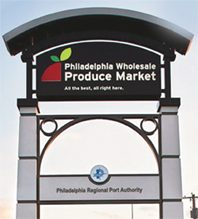Procacci Bros., in business since 1948, carries a wide variety of produce from around the world. Feighery notes local growers’ efforts to improve packaging, boxing, and labeling makes it more appealing to buyers.
In his view, the desire for local product stems from freight savings. When it’s harvest time in the northeast, growers in California are challenged to compete against local growers who have competitive pricing and a savings of as much as $9 per box on freight. “That’s a lot of money, particularly when consumers are looking for value,” Feighery says.
Procacci’s business is diversified enough to meet various customer demands, including for local product. Santa Sweet tomatoes and ‘Ugly Ripe’ tomatoes are top selling local products. The tomatoes are grown in New Jersey, other states, and also in Mexico.
The company controls production from seed to fruit—which includes a research facility in Florida to find disease resistant varieties, and packing facilities throughout the United States and Mexico. Having research fields in Florida allows the company to experiment with various growing methods and conditions.
“The growing conditions in each location are completely different,” Feighery explains, “and the growing conditions in the same location are completely different.” Each year, Feighery says the variables change, including cold or warm starts and too much or too little moisture. “It takes months to plan, organize, and prepare what you’re going to grow,” he points out, and all of this is long before actually getting to the point of planting seeds.
What’s Hot: Ethnic & Specialty Choices
Though consumer demand for local produce is growing, it’s nowhere near the demand for ethnic produce or having year-round availability of fruits and vegetables. In more recent years, ethnic diversity in Philadelphia has grown significantly, with consumers wanting the fresh fruit and vegetables of their home countries.
Such demand has put a wide range of commodities on store shelves and in restaurants that simply were not available a decade ago. Subsequently, many tropical fruits and Asian vegetables have become mainstream items. Vena believes the area’s strong restaurant industry has helped drive interest in ethnic commodities in both foodservice and in retail outlets.
Levin reports increased demand for both ripe and unripe plantains and Storey has had more requests for cilantro. Curtis used to sell hundreds of cases of endive and escarole each week, some of which has been replaced by California leaf lettuces, Spring Mix, and prepackaged processed greens.



